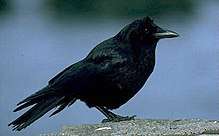crow
English

Pronunciation
- (Received Pronunciation) IPA(key): /kɹəʊ/
- (US) enPR: krō, IPA(key): /kɹoʊ/
Audio (US) (file) - Rhymes: -əʊ
Etymology 1
From Middle English crowe, from Old English crāwe, from Proto-Germanic *krāwō (compare West Frisian krie, Dutch kraai, German Krähe), from *krāhaną ‘to crow’. See below.
Noun
crow (plural crows)
- A bird, usually black, of the genus Corvus, having a strong conical beak, with projecting bristles; it has a harsh, croaking call.
- 1922, E.R. Eddison, The Worm Ouroborus:
- Gaslark in his splendour on the golden stairs saying adieu to those three captains and their matchless armament foredoomed to dogs and crows on Salapanta Hills.
-
- The cry of the rooster.
- Synonym: cock-a-doodle-doo
- Any of various dark-coloured nymphalid butterflies of the genus Euploea.
- A bar of iron with a beak, crook, or claw; a bar of iron used as a lever; a crowbar.
- 1796, Matthew Lewis, The Monk, Folio Society, published 1985, page 267:
- He approached the humble tomb in which Antonia reposed. He had provided himself with an iron crow and a pick-axe: but this precaution was unnecessary.
- Synonym: crowbar
-
- A gangplank (corvus) used by the Roman navy to board enemy ships.
- (among butchers) The mesentery of an animal.
Derived terms
- American crow (Corvus brachyrhynchos)
- as the crow flies
- Australian crow (Corvus orru)
- Banggai crow (Corvus unicolor)
- bare-faced crow (Corvus tristis)
- Bismarck crow (Corvus insularis)
- black crow (Corvus capensis)
- Bougainville crow (Corvus meeki)
- brown-headed crow (Corvus fuscicapillus)
- Cape crow (Corvus capensis)
- carrion crow (Corvus corone)
- collared crow (Corvus torquatus)
- crow's foot ("facial wrinkle")
- Cuban crow (Corvus nasicus)
- Danish crow (Corvus cornix)
- eat crow
- Eurasian crow (Corvus corone)
- fish crow (Corvus ossifragus)
- Flores crow (Corvus florensis)
- grey crow (Corvus tristis)
- Hawaiian crow (Corvus hawaiiensis, Corvus tropicus)
- high-billed crow (†Corvus impluviatus)
- hooded crow (Corvus cornix)
- hoodiecrow (Corvus cornix)
- house crow (Corvus splendens)
- Jamaican crow (Corvus jamaicensis)
- jungle crow (Corvus macrorhynchos)
- large-billed crow (Corvus macrorhynchos macrorhynchus)
- little crow (Corvus bennetti)
- long-billed crow (Corvus validus)
- Mariana crow (Corvus kubaryi)
- Mesopotamian crow (Corvus cornix capellanus)
- New Caledonian crow (Corvus moneduloides)
- †New Ireland crow
- northwestern crow (Corvus caurinus)
- palm crow (Corvus palmarum)
- pied crow (Corvus albus)
- piping crow (Corvus typicus)
- Puerto Rican crow (Corvus pumilis)
- robust crow (Corvus viriosus)
- Salomon Islands crow (Corvus meeki, Corvus woodfordi)
- Scotch crow (Corvus cornix)
- Sinaloan crow (Corvus sinaloae)
- slender-billed crow (Corvus enca)
- Somali crow (Corvus edithae)
- stone the crows
- Tamaulipas crow (Corvus imparatus)
- Torresian crow (Corvus orru)
- violaceous crow (Corvus enca violaceus)
- white-billed crow (Corvus woodfordi)
- white-necked crow (Corvus leucognaphalus)
Related terms
Translations
|
|
|
See also
- caw
- murder of crows (“flock of crows”)
- raven
Further reading

Etymology 2
Middle English crowen, from Old English crāwan (past tense crēow, past participle crāwen), from Proto-Germanic *krēaną (compare Dutch kraaien, German krähen), from Proto-Indo-European *greh₂- ‘to caw, croak’ (compare Lithuanian gróti, Russian гра́ять (grájatʹ)). Related to croak.
Verb
crow (third-person singular simple present crows, present participle crowing, simple past crowed or (UK) crew, past participle crowed or (archaic) crown)
- To make the shrill sound characteristic of a rooster; to make a sound in this manner, either in joy, gaiety, or defiance.
- c. 1599–1602, William Shakespeare, “The Tragedie of Hamlet, Prince of Denmarke”, in Mr. William Shakespeares Comedies, Histories, & Tragedies: Published According to the True Originall Copies (First Folio), London: Printed by Isaac Iaggard, and Ed[ward] Blount, published 1623, OCLC 606515358, [Act I, scene ii]:
- The morning cock crew loud.
- 1962, Bob Dylan (lyrics and music), “Don't Think Twice, It's All Right”, in The Freewheelin' Bob Dylan:
- When your rooster crows at the break o' dawn / Look out your window and I'll be gone.
-
- To shout in exultation or defiance; to brag.
- Synonym: brag
- He's been crowing all day about winning the game of cards.
- To utter a sound expressive of joy or pleasure.
- 1847, Alfred, Lord Tennyson, The Princess, Part II:
- the sweetest little maid / That ever crowed for kisses
- 1868, Anthony Trollope, He Knew He Was Right XI:
- The child was at this time about ten months old, and was a strong, hearty, happy infant, always laughing when he was awake and always sleeping when he did not laugh, because his little limbs were free from pain and his little stomach was not annoyed by internal troubles. He kicked, and crowed, and sputtered, when his mother took him, and put up his little fingers to clutch her hair, and was to her as a young god upon the earth. Nothing in the world had ever been created so beautiful, so joyous, so satisfactory, so divine!
- 1913, D.H. Lawrence, chapter 2, in Sons and Lovers:
- Hearing the miner's footsteps, the baby would put up his arms and crow.
-
- (music) To test the reed of a double reed instrument by placing the reed alone in the mouth and blowing it.
Usage notes
The past tense crew in modern usage is confined to literary and metaphorical uses, usually with reference to the story of Peter in Luke 22.60. The past participle crown is similarly poetical.
Translations
|
|
|
|